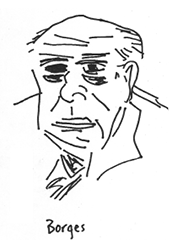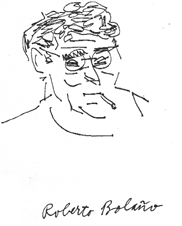Writers (8 page)
Authors: Barry Gifford
Tags: #plays, #theater, #theatre, #writers, #beats, #poets, #authors, #vignettes, #barry gifford, #novelists

THE
NOBODY

Â
Â
CAST OF
CHARACTERS
Emily Dickinson
,
fifty-one years old, an unpublished poet
Lavinia
, her
sister
SETTING
The parlor of the Dickinson
family,
Amherst, Massachusetts, in
1882
.
The
two
sisters
are
seated
at
a
table,
drinking
tea.
Â
Â
LAVINIA
Perhaps
we'll
be able now to become
closer.
EMILY
What do you mean by
“now”?
LAVINIA
Now
that Mother is gone and
we're
living
together.
EMILY
The one has nothing to do with the
other.
LAVINIA
After all, we are
sisters.
EMILY
Please, Lavinia. Why this sudden
desire?
LAVINIA
But I love you,
Emily.
EMILY
The test of love, Lavinia, is
death.
LAVINIA
Why be rude?
I'm
trying . .
.
EMILY
Don't
try.
LAVINIA
You were nice to me once, before you visited Father in Washington, when he was in Congress. After that, after your . . . interlude in Philadelphia, you were different.
EMILY
I was
twenty-three.
LAVINIA
Thirty years
ago.
EMILY
Twenty-eight.
LAVINIA
Can't you tell me about him now, Emily? What really did happen? He was a poet, too, wasn't he? I know he was a preacher, and married.
EMILY
From
whom do you get this
information?
LAVINIA
About him, from Susan. About you, my own
experience.
EMILY
Our sister-in-law was earlier capable of keeping a confidence. No longer does her heart control her mind. Her mind controls her heart.
LAVINIA
She and Austin both care about your
welfare.
EMILY
Why?
I'm
nobody.
Who are you?
Aren't
you
nobody,
too?
LAVINIA
You're
afraid
to
think
about
it,
aren't
you?
The
moment
that
changed your
life.
EMILY
Do
you
suppose
I
could
be
she?
This
person
you
imagine
me
to
be?
LAVINIA
I am waiting for her to reveal
herself.
EMILY
All things come to she who waits. Alas, come they not
'til
past
the pearly gates.
LAVINIA
You
remain
inscrutable.
EMILY
What would please
you
most,
Lavinia?
To
know
if at
the age
of
twen
ty-three
I
allowed
an
older,
married
manâa
ministerâto
deflower
me?
LAVINIA
You
do write often of
flowers.
EMILY
And since a score and eight
I've
had no bread upon my
plate.
EMILY
stands, begins to walk, then
collapses to the
floor.
LAVINIA
rushes to
her and kneels at
EMILY
's
side.
LAVINIA
Forgive me, sister. I'll not mention this
again.
EMILY
Oh,
Lavinia,
it
does
not
matter.
Nothing
happened
to
me,
that's
what happened.
EMILY
rises to her feet.
LAVINIA
stands next to
her.
LAVINIA
Nor to me. We are fortunate, Emily, aren't we? To have avoided everything?
EMILY
There
is
nothing
less,
Lavinia,
and
as
we
know
it
to
be
true,
nothing less will
do.
They
embrace.
END
Â
Â
AFTER
WORDS


Â
Â
CAST OF
CHARACTERS
Jorge Luis Borges
,
during his lifetime (
1899â1986
) an Argentinian writer, now a ghost
Roberto Bolaño
,
a Chilean writer living in Spain, forty-nine years old
SETTING
Bolaño
is
walking
along
the
beach
near
his
residence
in
Blanes, Spain, in
2001
. He is smoking a cigarette. He stops when he
hears a voice behind
him.
Â
Â
BORGES
I've
been given to understand that you are, in a literary
way,
impersonating me.
BOLAÃO
turns
around
and
sees
the
ghost of
JORGE
LUIS
BORGES
.
BOLAÃO
This
can't
be.
You're
dead.
BORGES
So
will
you
be.
Quite
soon,
as
the
doctors
have
informed
you.
That's
why
I've
chosen this moment to confront you, while you still
have time to admit it.
BOLAÃO
You
could
have
waited,
couldn't
you?
When
both
of
us
were
ghosts.
BORGES
You don't
know how difficult it can be to locate a fellow shade.
I've
been searching for Melville for years without success. But tell
me, is
this
compulsion
of
yours
an
homage
or
are
you
feeding
off
my corpus?
BOLAÃO
Clever of you to make the distinction between corpus and
corpse.
Your
body of work as opposed to your
body.
BORGES
Hardly.
I
was
never
lazy
when
it
came
to
knowing
the
correct
words. They were the missiles in my
arsenal.
BOLAÃO
I assume you're referring to my story, “The Insufferable Gaucho.” If not for “The South,” which you singled out as your favorite among your own stories, there would be no modern Latin American literature.
BORGES
I immodestly
concur.
(He bows
slightly.)
BOLAÃO
I honor you each time I pick up a pen. I like the idea of your
looking over my shoulder. In fact, I
wouldn't
mind your
admonishing me whenever you see where
I'm
going
wrong.
BORGES
I'm
blind,
Bolaño.
I
can't
tell
what
you're
writing.
It's
only
well
after the fact, when a friendly familiar reads to me from a book or
news
paper,
that
I'm
able to make a judgment.
My
methods affect
your essays as well as your
stories.
BOLAÃO
Señor Borges, my intentions are honorable, I assure you.
I've
written
badly
at
times,
of
course.
Not
so
badly
at
others.
I'm
sloppy sometimes, repetitious, self-indulgent, ignorant, even
mean-spirited.
After
all,
I
have
to
make
a
living.
I
have
a
wife
and
two
children to
support.
BORGES
I like what
you've
written about
Turgenev.
I encountered him
not long
after
my
death.
He
told
me
he
was
especially
fond
of
my
story,
“Funes,
the
Memorius,”
and
invited
me
to
join
the
Russian
and French writers in their nightly game of pinochle. Of course I
declined, but I did compose a story in my mind involving an
unrequited
love
affair
between
the
queen
of
spades
and
the
knave
of diamonds,
which
ended
badly.
Pinochle
is
interesting
in
principle
if only
for
the
exclusive
use
of
cards
above
the
number
eight,
which
is the sign for infinity set
vertically.
BOLAÃO
Did you return
Turgenev's
compliment?
BORGES
I said I thought
he'd
missed the mark with
Rudin
.
BOLAÃO
I
agree,
but
he
was
young
when
he
wrote
it,
he
didn't
know
enough of life yet.
I've
always thought it could have been made into a
good movie.
It
still could, though Hollywood would have the woman
he spurned witness his death on the barricades.
BORGES
Due to my condition,
I've
no use for the
cinema.
BOLAÃO
It
was good of Hemingway to list
The
Sportsman's
Notebook
as
one of
his
foundation
texts.
Also
Fathers
and
Sons
.
He
took
that
title
for one of his own short
stories.
BORGES
I've
forgotten
everything
of
Hemingway's
except
for
“The
Undefeat
ed,”
the one about Manuel Garcia, a forlorn and doomed old
mat
ador.
When finally the sword found its
way,
Manuel Garcia
buried four fingers and his thumb into the bull. Badly gored, he
needed to mix his own blood with that of his adversary's. Hemingway
was only in his twenties when he wrote that
story,
yet
it's
very
wise.
BOLAÃO
It's
fashionable these days to bash
Hemingway.
I admire him
for giving
credit
to
his
most
significant
influences.
Camus
took
his
style from Hemingway and James M.
Cain.
BORGES
You're
cheeky,
but serious, Bolaño, a mildly entertaining and
very bad
critic.
Come
find
me
after
your
death.
We'll
have
plenty
of
time to talk.
BOLAÃO
How
do I find you?
You
haven't
yet come across Melville
though
you've
been dead for
years.
BORGES
It
will
happen
eventually.
There's
a
great
deal
of
traffic
in
these
corridors. Perhaps he
doesn't
want to talk.
I've
heard
he's
still bitter
about not having been able to publish his masterpiece,
Billy
Budd
, during his lifetime.
You
and I are bound to collide sooner or
later.
When we do, I'll tell you
what's
missing in your
work.
BOLAÃO
What's
missing? Why not tell me
now,
while
I'm
still
writing?
BORGES
Go
again
to
“The
South.”
Therein
lies
the
key.
JORGE
LUIS
BORGES
disappears.
ROBERTO
Bolaño
looks in every
direction but the ghost is gone.
BOLAÃO
Damn,
I
hate
mysteries!
This
is
a
story
I
could
have
written,
one without an
answer.
Only Borges could have written it
better.
END
Â
Â
